莎士比亚十四行诗图文稿
- 格式:docx
- 大小:247.62 KB
- 文档页数:8
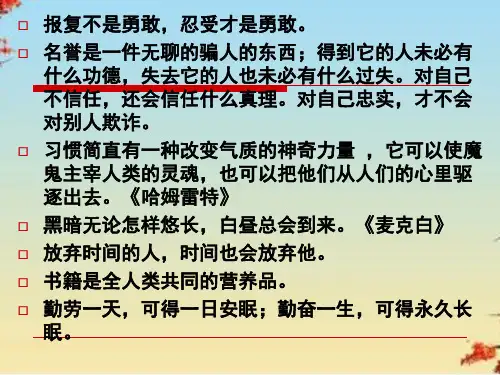
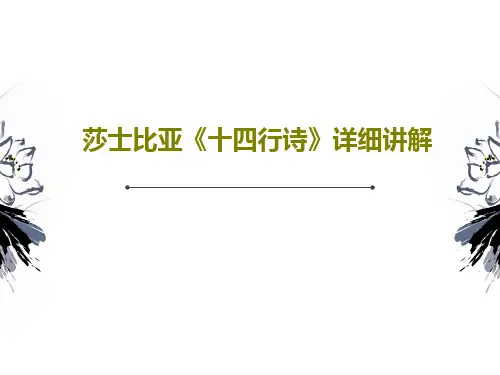
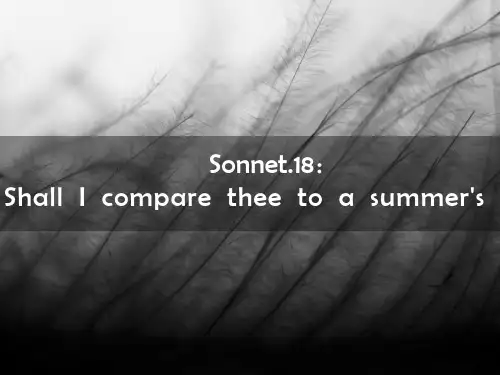
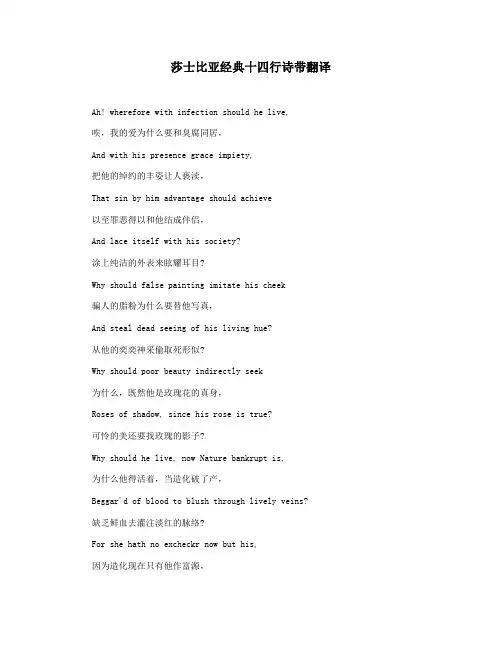
莎士比亚经典十四行诗带翻译Ah! wherefore with infection should he live,唉,我的爱为什么要和臭腐同居,And with his presence grace impiety,把他的绰约的丰姿让人亵渎,That sin by him advantage should achieve以至罪恶得以和他结成伴侣,And lace itself with his society?涂上纯洁的外表来眩耀耳目?Why should false painting imitate his cheek 骗人的脂粉为什么要替他写真,And steal dead seeing of his living hue?从他的奕奕神采偷取死形似?Why should poor beauty indirectly seek为什么,既然他是玫瑰花的真身,Roses of shadow, since his rose is true?可怜的美还要找玫瑰的影子?Why should he live, now Nature bankrupt is,为什么他得活着,当造化破了产,Beggar'd of blood to blush through lively veins?缺乏鲜血去灌注淡红的脉络?For she hath no excheckr now but his,因为造化现在只有他作富源,And, proud of many, lives upon his gains.自夸富有,却靠他的利润过活。
O, him she stores, to show what wealth she had 哦,她珍藏他,为使荒歉的今天In days long since, before these last so bad.认识从前曾有过怎样的丰年。
Tired with all these, for restful death I cry,厌了这一切,我向安息的死疾呼,As, to behold desert a beggar born,比方,眼见天才注定做叫化子,And needy nothing trimm'd in jollity,无聊的草包打扮得衣冠楚楚,And purest faith unhappily forsworn,纯洁的信义不幸而被人背弃,And guilded honour shamefully misplaced,金冠可耻地戴在行尸的头上,And maiden virtue rudely strumpeted,处女的贞操遭受暴徒的玷辱,And right perfection wrongfully disgraced,严肃的正义被人非法地诟让,And strength by limping sway disabled,壮士被当权的跛子弄成残缺,And art made tongue-tied by authority,愚蠢摆起博士架子驾驭才能,And folly doctor-like controlling skill,艺术被官府统治得结舌箝口,And simple truth miscall'd simplicity,淳朴的真诚被人瞎称为愚笨,And captive good attending captain ill:囚徒"善"不得不把统帅"恶"伺候:Tired with all these, from these would I be gone,厌了这一切,我要离开人寰,Save that, to die, I leave my love alone.但,我一死,我的爱人便孤单。

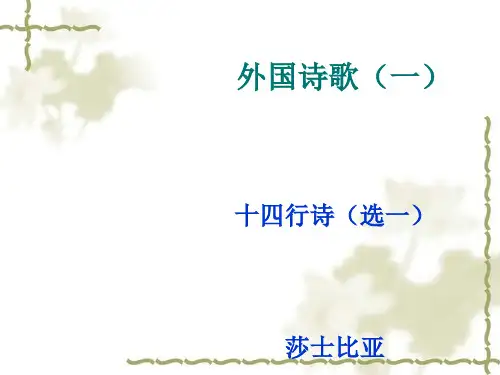
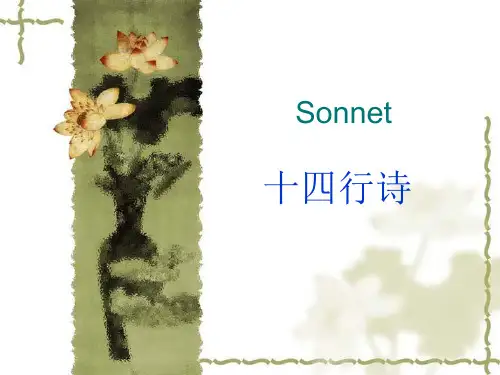

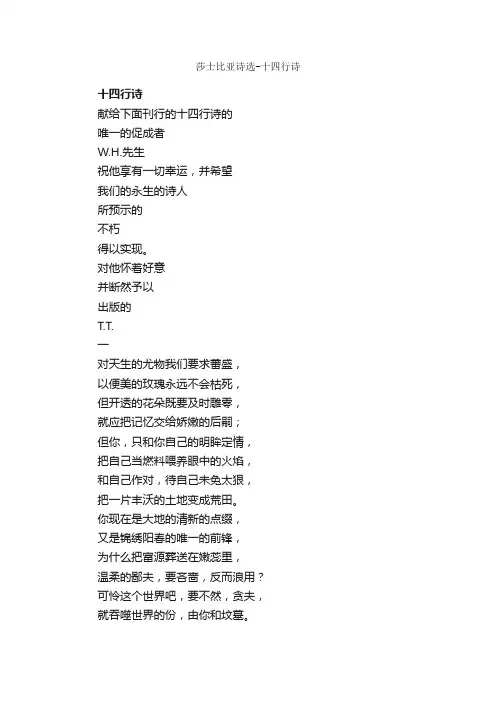
莎士比亚诗选-十四行诗十四行诗献给下面刊行的十四行诗的唯一的促成者W.H.先生祝他享有一切幸运,并希望我们的永生的诗人所预示的不朽得以实现。
对他怀着好意并断然予以出版的T.T.一对天生的尤物我们要求蕃盛,以便美的玫瑰永远不会枯死,但开透的花朵既要及时雕零,就应把记忆交给娇嫩的后嗣;但你,只和你自己的明眸定情,把自己当燃料喂养眼中的火焰,和自己作对,待自己未免太狠,把一片丰沃的土地变成荒田。
你现在是大地的清新的点缀,又是锦绣阳春的唯一的前锋,为什么把富源葬送在嫩蕊里,温柔的鄙夫,要吝啬,反而浪用?可怜这个世界吧,要不然,贪夫,就吞噬世界的份,由你和坟墓。
当四十个围攻你的朱颜,在你美的园地挖下深的战壕,你青春的华服,那么被人艳羡,将成褴褛的败絮,谁也不要瞧:那时人若问起你的美在何处,哪里是你那少壮年华的宝藏,你说,“在我这双深陷的眼眶里,是贪婪的羞耻,和无益的颂扬。
” 你的美的用途会更值得赞美,如果你能够说,“我这宁馨小童将总结我的账,宽恕我的老迈,” 证实他的美在继承你的血统!这将使你在衰老的暮年更生,并使你垂冷的血液感到重温。
三照照镜子,告诉你那镜中的脸庞,说现在这庞儿应该另造一副;如果你不赶快为它重修殿堂,就欺骗世界,剥掉母亲的幸福。
因为哪里会有女人那么淑贞她那处女的胎不愿被你耕种?哪里有男人那么蠢,他竟甘心做自己的坟墓,绝自己的血统?你是你母亲的镜子,在你里面她唤回她的盛年的芳菲四月:同样,从你暮年的窗你将眺见——纵皱纹满脸——你这黄金的岁月。
但是你活着若不愿被人惦记,就独自死去,你的肖像和你一起。
俊俏的浪子,为什么把你那份美的遗产在你自己身上耗尽?造化的馈赠非赐予,她只出赁;她慷慨,只赁给宽宏大量的人。
那么,美丽的鄙夫,为什么滥用那交给你转交给别人的厚礼?赔本的高利贷者,为什么浪用那么一笔大款,还不能过日子?因为你既然只和自己做买卖,就等于欺骗你那妩媚的自我。
这样,你将拿什么账目去交代,当造化唤你回到她怀里长卧?你未用过的美将同你进坟墓;用呢,就活着去执行你的遗嘱。

SONNET #1by: William ShakespeareFROM fairest creatures we desire increase,That thereby beauty's rose might never die,But as the riper should by time decease,His tender heir might bear his memory;But thou, contracted to thine own bright eyes,Feed'st thy light's flame with self-substantial fuel,Making a famine where abundance lies,Thyself thy foe, to thy sweet self too cruel.Thout that are now the world's fresh ornamentAnd only herald to the gaudy spring,Within thine own bud buriest thy contentAnd, tender churl, mak'st waste in niggarding.Pity the world, or else this glutton be,To eat the world's due, by the grave and thee. SONNET #2by: William ShakespeareWHEN forty winters shall besiege thy browAnd dig deep trenches in thy beauty's field,Thy youth's proud livery, so gazed on now,Will be a tottered weed of small worth held:Then being asked where all thy beauty lies,Where all the treasure of thy lusty days,To say within thine own deep-sunken eyesWere an all-eating shame and thriftless praise.How much more prasie deserved thy beauty's useIf thou couldst answer, 'This fair child of mineShall sum my count and make my old excuse,'Proving his beauty by succession thine.This were to be new made when thou art oldAnd see thy blood warm when thou feel'st cold. SONNET #3by: William ShakespeareLOOK in thy glass, and tell the face thou viewestNow is the time that face should form another,Whose fresh repair if now thou renewest,Thou dost beguile the world, unbless some mother.For where is she so fair whose uneared wombDisdains the tillage of thy husbandry?Or who is he so fond will be the tombOf his self-love, to stop posterity?Thou art thy mother's glass, and she in theeCalls back the lovely April of her prime;So thou through windows of thine age shalt see,Despite of wrinkles, this thy golden time.But if thou live rememb'red not to be,Die single, and thine image dies with thee. SONNET #4by: William ShakespeareUNTHRIFTY loveliness, why dost thou spendUpon thyself they beauty's legacy?Nature's bequest gives nothing but doth lend,And, being frank, she lends to those are free.Then, beateous niggard, why dost thou abuseThe bounteous largess given thee to give?Profitless userer, why dost thou useSo great a sum of sums, yet canst not live?For, having traffic with thyself alone,Thou of thyself thy sweet self dost deceive:Then how, when Nature calls thee to be gone,What acceptable audit canst thou leave?Thy unused beauty must be tombed with thee,Which, usèd, lives th' executor to be.SONNET #5by: William ShakespeareTHOSE hours that with gentle work did frameThe lovely gaze where every eye doth dwellWill play the tyrants to the very sameAnd that unfair which fairly doth excel;For never-resting time leads summer onTo hideous winter and confounds him there,Sap checked with frost and lusty leaves quite gone,Beauty o'ersnowed and bareness everywhere.Then, were not summer's distillation leftA liquid prisoner pent in walls of glass,Beauty's effect with beauty were bereft,Nor it nor no remembrance what it was:But flowers distilled, though they with winter meet,Leese but there snow; their substance still lives sweet. SONNET #6by: William ShakespeareTHEN let not winter's ragged hand defaceIn thee thy summer ere thou be distilled:Make sweet some vial; treasure thou some placeWith beauty's treasure ere it be self-killed.That use is not forbidden usuryWhich happies those that pay the willing loan;That's for thyself to breed another thee,Or ten times happier be it ten for one.Ten times thyself were happier than thou art,If ten of thine ten times refigured thee:Then what could death do if thou shouldst depart,Leaving thee living in posterity?Be not self-willed, for thou art much too fairTo be death's conquest and make worms thine heir. SONNET #7by: William ShakespeareLO, in the orient when the gracious lightLifts up his burning head, each under eyeDoth homage to his new-appearing sight,Serving with looks his sacred majesty;And having climbed the steep-up heavenly hill,Resembling strong yough in his middle age,Yet mortal looks adore his beauty still,Attending on his golden pilgrimage;But when from highmost pitch, with weary car,Like feeble age he reeleth from the day,The eyes, fore duteous, now converted areFrom his low tract and look another way:So thou, thyself outgoing in thy noon,Unlooked on diest unless thou get a son. SONNET #8by: William ShakespeareMUSIC to hear, why hear'st thou music sadly?Sweets with sweets war not, joy delights in joy:Why lov'st thou that which thou receiv'st not gladly, Or else receiv'st with pleasure thine annoy?If the true concord of well-tunèd sounds,By unions married, do offend thine ear,They do but sweetly chide thee, who confoundsIn singleness the parts that thou shouldst bear.Mark how one string, sweet husband to another,Strikes each in each by mutual ordering;Resembling sire and child and happy mother,Who, all in one, one pleasing note do sing;Whose speechless song, being many, seeming one,Sings this to thee, 'Thou single wilt prove none.' SONNET #9by: William ShakespeareIS it for fear to wet a widow's eyeThat thou consum'st thyself in single life?Ah, if thou issueless shalt hap to die,The world will wail thee like a makeless wife;The world will be thy widow, and still weepThat thou no form of thee hast left behind,When every private widow well may keep,By children's eyes, her husband's shape in mind.Look what an unthrift in the world doth spendShifts but his place, for still the world enjoys it;But beauty's waste hath in the world an end,And, kept unused, the user so destroys it:No love toward others in that bosom sitsThan on himself such murd'rous shame commits SONNET #10by: William ShakespeareFOR shame, deny that thou bear'st love to anyWho for thyself art so unprovident:Grant, if thou wilt, thou art beloved of many,But that thou none lov'st is most evident;For thou art so possessed with murd'rous hateThat 'gainst thyself thou stick'st not to conspire,Seeking that beauteous roof to ruinateWhich to repair should be thy chief desire.O, change thy thought, that I may change my mind;Shall hate be fairer lodged than gentle love?Be as thy presence is, gracious and kind,Or to thyself at least kind-hearted prove:Make thee another self for love of me,That beauty still may live in thine or thee.SONNET #11by: William ShakespeareAS fast as thou shalt wane, so fast thou grow'stIn one of thine, from that which thou departest;And that fresh blood which youngly thou bestow'stThou mayst call thine when thou from youth convertest.Herein lives wisdom, beauty, and increase;Without this, folly, age, and cold decay.If all were minded so, the times should cease,And threescore year would make the world away.Let those whom Nature hath not made for store,Harsh, featureless, and rude, barrenly perish:Look whom she best endowed she gave the more,Which bounteous gift thou shouldst in bounty cherish.She carved thee for her seal, and meant therebyThou shouldst print more, not let that copy die. SONNET #12by: William ShakespeareWHEN I do count the clock that tells the timeAnd see the brave day sunk in hideous night,When I behold the violet past primeAnd sable curls all silvered o'er with white,When lofty trees I see barren of leaves,Which erst from heat did canopy the herd,And summer's green all girded up in sheavesBorne on the bier with white and bristly beard;Then of thy beauty do I question makeThat thou among the wastes of time must go,Since sweets and beauties do themselves forsakeAnd die as fast as they see others grow;And nothing 'gainst Time's scythe can make defense Save breed, to brave him when he takes thee hence. SONNET #13by: William ShakespeareO , THAT you were yourself, but, love, you areNo longer yours than you yourself here live:Against this coming end you should prepare,And your sweet semblance to some other give.So should that beauty which you hold in leaseFind no determination; then you wereYourself again after yourself's deceaseWhen your sweet issue your sweet form should bear.Who lets so fair a house fall to decay,Which husbandry in honor might upholdAgainst the stormy gusts of winter's dayAnd barren rage of death's eternal cold?O, none but unthrifts! Dear my love, you knowYou had a father -- let your son say so.SONNET #14by: William ShakespeareNOT from the stars do I my judgment pluck,And yet methinks I have astronomy;But not to tell of good or evil luck,Of plagues, of dearths, or season's quality;Nor can I fortune to brief minutes tell,Pointing to each his thunder, rain, and wind,Or say with princes if it shall go wellBy oft predict that I in heaven find;But from thine eyes my knowledge I derive,And, constant stars, in them I read such artAs truth and beauty shall together thriveIf from thyself to store thou wouldst convert:Or else of thee this I prognosticate,Thy end is truth's and beauty's doom and date. SONNET #15by: William ShakespeareWHEN I consider everything that growsHolds in perfection but a little moment,That this huge stage presenteth nought but showsWhereon the stars in secret influence comment;When I perceive that men as plants increase,Cheerèd and checked even by the selfsame sky,V aunt in their youthful sap, at height decrease,And wear their brave state out of memory:Then the conceit of this inconstant staySets you most rich in youth before my sight,Where wasteful Time debateth with DecayTo change your day of youth to sullied night;And, all in war with Time for love of you,As he takes from you, I ingraft you new.SONNET #16by: William ShakespeareBUT wherefore do not you a mightier wayMake war upon this bloody tyrant, Time?And fortify yourself in your decayWith means more blessèd than my barren rime?Now stand you on the top of happy hours,And many maiden gardens, yet unset,With virtuous wish would bear your living flowers,Much liker than your painted counterfeit:So should the lines of life that life repairWhich this time's pencil or my pupil pen,Neither in inward worth nor outward fairCan make you live yourself in eyes of men.To give away yourself keeps yourself still,And you must live, drawn by your own sweet skill."Sonnet #16" was originally published in Shake-speares Sonnets: Never before Imprinted (1609).SONNET #17by: William ShakespeareHO will believe my verse in time to comeIf it were filled with your most high deserts?Though yet, heaven knows, it is but as a tombWhich hides your life and shows not half your parts.If I could write the beauty of your eyesAnd in fresh numbers number all your graces,The age to come would say, 'This poet lies--Such heavenly touches ne'er touched earthly faces.'So should my papers, yellowed with their age,Be scorned, like old men of less truth than tongue,And your true rights be termed a poet's rageAnd stretchèd metre of an antique song.But were some child of yours alive that time,You should live twice--in it and in my rime."Sonnet #17" was originally published in Shake-speares Sonnets: Never before Imprinted (1609).SONNET #18by: William ShakespeareShall I compare thee to a summer's day?Thou art more lovely and more temperate.Rough winds do shake the darling buds of May,And summer's lease hath all too short a date.Sometime too hot the eye of heaven shines,And often is his gold complexion dimmed;And every fair from fair sometime declines,By chance, or nature's changing course, untrimmed:But thy eternal summer shall not fadeNor lose possession of that fair thou ow'st,Nor shall Death brag thou wand'rest in his shadeWhen in eternal lines to time thou grow'st.So long as men can breathe or eyes can see,So long lives this, and this gives life to thee."Sonnet #18" was originally published in Shake-speares Sonnets: Never before Imprinted (1609).SONNET #19by: William ShakespeareDevouring time, blunt thou the lion's paws,And make the earth devour her own sweet brood;Pluck the keen teeth from the fierce tiger's jaws,And burn the long-lived phoenix in her blood;Make glad and sorry seasons as they fleet'st,And do whate'er thou wilt, swift-footed Time,To the wide world and all her fading sweets,But I forbid thee one most heinous crime:O, carve not with thy hours my love's fair brow,Nor draw no lines there with thine antique pen;Him in thy course untainted do allowFor beauty's pattern to succeeding men.Yet do thy worst, old Time: despite thy wrong,My love shall in my verse ever live young."Sonnet #19" was originally published in Shake-speares Sonnets: Never before Imprinted (1609).SONNET #20by: William Shakespeare (1564-1616)WOMAN'S face, with Nature's own hand painted,Hast thou, the master-mistress of my passion;A woman's gentle heart, but not acquaintedWith shifting change, as is false women's fashion;An eye more bright than theirs, less false in rolling,Gilding the object whereupon it gazeth;A man in hue all hues in his controlling,Which steals men's eyes and women's souls amazeth.And for a woman wert thou first created,Till Nature as she wrought thee fell a-doting,And by addition me of thee defeatedBy adding one thing to my purpose nothing.But since she pricked thee out for women's pleasure,Mine be thy love, and thy love's use their treasure."Sonnet #20" was originally published in Shake-speares Sonnets: Never before Imprinted(1609).SONNET #21by: William Shakespeare (1564-1616)O is it not with me as with that MuseStirred by a painted beauty to his verse,Who heaven itself for ornament doth useAnd every fair with his fair doth rehearse;Making a couplement of proud compareWith sun and moon, with earth and sea's rich gems,With April's first-born flowers, and all things rareThat heaven's airs in this huge rondure hems.O let me, true in love, but truly write,And then believe me, my love is as fairAs any mother's child, though not so brightAs those gold candles fixed in heaven's air:Let them say more that like of hearsay well;I will not praise that purpose not to sell."Sonnet #21" was originally published in Shake-speares Sonnets: Never before Imprinted (1609).SONNET #22by: William Shakespeare (1564-1616)MY glass shall not persuade me I am oldSo long as youth and thou are of one date;But when in thee time's furrows I behold,Then look I death my days should expiate.For all that beauty that doth cover theeIs but the seemly raiment of my heart,Which in they breast doth live, as thine in me:How can I then be elder than thou art?O therefore, love, be of thyself so waryAs I, not for myself, but for thee will,Bearing thy heart, which I will keep so charyAs tender nurse her babe from faring ill.Presume not on thy heart when mine is slain;Thou gav'st me thine not to give back again."Sonnet #22" was originally published in Shake-speares Sonnets: Never before Imprinted (1609).SONNET #23by: William Shakespeare (1564-1616)AS an unperfect actor on the stage,Who with his fear is put besides his part,Or some fierce thing replete with too much rage,Whose strength's abundance weakens his own heart;So I, for fear of trust, forget to sayThe perfect ceremony of love's rite,And in mine own love's strength seem to decay,O'ercharged with burden of mine own love's might.O, let my books be then the eloquenceAnd dump presagers of my speaking breast,Who plead for love, and look for recompense,More than that tongue that more hath more expressed.O, learn to read what silent love hath writ:To hear with eyes belongs to love's fine wit."Sonnet #23" was originally published in Shake-speares Sonnets: Never before Imprinted (1609).SONNET #24by: William Shakespeare (1564-1616)MINE eye hath played the painter and hath stelledThy beauty's form in table of my heart;My body is the frame wherein 'tis held,And perspective it is best painter's art.For through the painter must you see his skillTo fine where your true image pictured lies,Which in my bosom's shop is hanging still,That hath his windows glazèd with thine eyes.Now see what good turns eyes for eyes have done:Mine eyes have drawn thy shape, and thine for meAre windows to my breast, wherethrough the sunDelights to peep, to gaze therein on thee.Yet eyes this cunning want to grace their art;They draw but what they see, know not the heart."Sonnet #24" was originally published in Shake-speares Sonnets: Never before Imprinted (1609).SONNET #25by: William Shakespeare (1564-1616)LET those who are in favor with their starsOf public honor and proud titles boast,Whilst I, whom fortune of such triumph bars,Unlooked for joy in that I honor most.Great princes' favorites their fair leaves spreadBut as the marigold at the sun's eye;And in themselves their pride lies burièd,For at a frown they in their glory die.The painful warrior famousèd for fight,After a thousand victories once foiled,Is from the book of honor rasèd quite,And all the rest forgot for which he toiled.Then happy I, that love and am belovedWhere I may not remove nor be removed."Sonnet #25" was originally published in Shake-speares Sonnets: Never before Imprinted (1609).SONNET #26by: William Shakespeare (1564-1616)LORD of my love, to whom in vassalageThy merit hath my duty strongly knit,To thee I send this written ambassageTo witness duty, not to show my wit;Duty so great, which wit so poor as mineMay make seem bare, in wanting words to show it,But that I hope some good coneit of thineIn thy soul's thought, all naked, will bestow it;Till whatsoever star that guides my movingPoints on me graciously with fair aspect,And puts apparel on my tottered lovingTo show me worthy of thy sweet respect:Then may I dare to boast how I do love thee;Till then not show my head where thou mayest prove me."Sonnet #26" was originally published in Shake-speares Sonnets: Never before Imprinted (1609).SONNET #27by: William Shakespeare (1564-1616)WEARY with toil, I haste to my bed,The dear repose for limbs with travel tired,But then begins a journey in my headTo work my mind when body's work's expired;For then my thoughts, from far where I abide,Intend a zealous pilgrimage to thee,And keep my drooping eyelids open wide,Looking on darkness which the blind do see;Save that my soul's imaginary sightPresents thy shadow to my sightless view,Which, like a jewel hung in ghastly night,Makes black night beauteous and her old face new.Lo, thus, by day my limbs, by night my mind,For thee and for myself no quiet find."Sonnet #27" was originally published in Shake-speares Sonnets: Never before Imprinted (1609).SONNET #28by: William Shakespeare (1564-1616)HOW can I then return in happy plightThat am debarred the benefit of rest,When day's oppression is not eased by night,And each, though enemies to either's reign,Do in consent shake hands to torture me,The one by toil, the other to complainHow far I toil, still farther off from thee?I tell the day, to please him, thou art brightAnd dost him grace when clouds do blot the heaven;So flatter I the swart-complexioned night,When sparkling stars twire not, thou gild'st the even.But day doth daily draw my sorrows longer,And night doth nightly make grief's strength seem stronger."Sonnet #28" was originally published in Shake-speares Sonnets: Never before Imprinted (1609).SONNET #29by: William Shakespeare (1564-1616)WHEN, in disgrace with Fortune and men's eyes,I all alone beweep my outcast state,And trouble deaf heaven with my bootless cries,And look upon myself and curse my fate,Wishing me like to one more rich in hope,Featured like him, like him with friend's possessed,Desiring this man's art, and that man's scope,With what I most enjoy contented least;Yet in these thoughts myself almost despising,Haply I think on thee, and then my state,Like to the lark at break of day arisingFrom sullen earth, sings hymns at heaven's gate;For thy sweet love rememb'red such wealth bringsThat then I scorn to change my state with kings."Sonnet #29" was originally published in Shake-speares Sonnets: Never before Imprinted (1609).SONNET #30by: William Shakespeare (1564-1616)WHEN to the sessions of sweet silent thoughtI summon up remembrance of things past,I sigh the lack of many a thought I sought,And with old woes new wail my dear time's waste:Then can I drown an eye, unused to flow,For precious friends hid in death's dateless night,And weep afresh love's long since cancelled woe,And moan th' expense of many a vanished sight.Then can I grieve at grievances foregone,And heavily from woe to woe tell o'erThe sad account of fore-bemoanèd moan,Which I new pay as if not paid before.But if the while I think on thee, dear friend,All losses are restored and sorrows end."Sonnet #30" was originally published in Shake-speares Sonnets: Never before Imprinted (1609).SONNET #31by: William Shakespeare (1564-1616)THY bosom is endearèd with all heartsWhich I by lacking have supposèd dead;And their reigns love, and all love's loving parts,And all those friends which I thought burièd.How many a holy and obsequious tearHath dear religious love stol'n from mine eye,As interest of the dead, which now appearBut things removed that hidden in thee lie!Thou art the grave where buried love doth live,Hung with the trophies of my lovers gone,Who all their parts of me to thee did give;That due of many now is thine alone.Their images I loved I vew in thee,And thou, all they, hast all the all of me."Sonnet #31" was originally published in Shake-speares Sonnets: Never before Imprinted (1609).SONNET #32by: William Shakespeare (1564-1616)IF thou survive my well-contented dayWhen that churl Death my bones with dust shall cover,And shalt by fortune once more resurveyThese poor rude lines of thy deceasèd lover,Compare them with the bett-ring of the time,And though they be outstripped by every pen,Reserve them for my love, not for their rime,Exceeded by the height of happier men.O, then vouchsafe me but this loving thought:'Had my friend's Muse grown with this growing age,A dearer birth than this his love had broughtTo march in ranks of better equipage;But since he died, and poets better prove,Theirs for their style I'll read, his for his love.'。
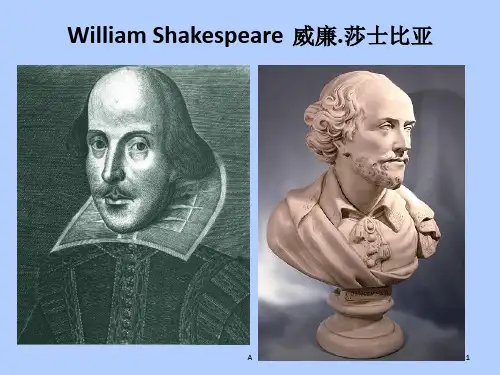
莎士比亚十四行诗(SHAKESPEAR SONNETS 51~100)LIThus can my love excuse the slow offenceOf my dull bearer when from thee I speed:From where thou art why should I haste me thence?Till I return, of posting is no need.O! what excuse will my poor beast then find,When swift extremity can seem but slow?Then should I spur, though mounted on the wind,In winged speed no motion shall I know,Then can no horse with my desire keep pace.Therefore desire, (of perfect'st love being made)Shall neigh, no dull flesh, in his fiery race;But love, for love, thus shall excuse my jade-Since from thee going, he went wilful-slow,Towards thee I'll run, and give him leave to go.LIISo am I as the rich, whose blessed key,Can bring him to his sweet up-locked treasure,The which he will not every hour survey,For blunting the fine point of seldom pleasure.Therefore are feasts so solemn and so rare,Since, seldom coming in the long year set,Like stones of worth they thinly placed are,Or captain jewels in the carcanet.So is the time that keeps you as my chest,Or as the wardrobe which the robe doth hide,To make some special instant special-blest,By new unfolding his imprison'd pride.Blessed are you whose worthiness gives scope,Being had, to triumph; being lacked, to hope.LIIIWhat is your substance, whereof are you made,That millions of strange shadows on you tend?Since every one hath, every one, one shade,And you but one, can every shadow lend.Describe Adonis, and the counterfeitIs poorly imitated after you;On Helen's cheek all art of beauty set,And you in Grecian tires are painted new:Speak of the spring, and foison of the year,The one doth shadow of your beauty show,The other as your bounty doth appear;And you in every blessed shape we know.In all external grace you have some part,But you like none, none you, for constant heart.LIVO! how much more doth beauty beauteous seemBy that sweet ornament which truth doth give.The rose looks fair, but fairer we it deemFor that sweet odour, which doth in it live.The canker blooms have full as deep a dyeAs the perfumed tincture of the roses,Hang on such thorns, and play as wantonlyWhen summer's breath their masked buds discloses: But, for their virtue only is their show,They live unwoo'd, and unrespected fade;Die to themselves. Sweet roses do not so;Of their sweet deaths are sweetest odours made: And so of you, beauteous and lovely youth,When that shall vade, my verse distills your truth. LVNot marble, nor the gilded monumentsOf princes, shall outlive this powerful rhyme;But you shall shine more bright in these contents Than unswept stone, besmear'd with sluttish time. When wasteful war shall statues overturn,And broils root out the work of masonry,Nor Mars his sword, nor war's quick fire shall burn The living record of your memory.'Gainst death, and all oblivious enmityShall you pace forth; your praise shall still find room Even in the eyes of all posterityThat wear this world out to the ending doom.So, till the judgment that yourself arise,You live in this, and dwell in lovers' eyes.LVISweet love, renew thy force; be it not saidThy edge should blunter be than appetite,Which but to-day by feeding is allay'd,To-morrow sharpened in his former might:So, love, be thou, although to-day thou fillThy hungry eyes, even till they wink with fulness,To-morrow see again, and do not killThe spirit of love, with a perpetual dulness.Let this sad interim like the ocean beWhich parts the shore, where two contracted newCome daily to the banks, that when they seeReturn of love, more blest may be the view;As call it winter, which being full of care,Makes summer's welcome, thrice more wished, more rare. LVIIBeing your slave what should I do but tendUpon the hours, and times of your desire?I have no precious time at all to spend;Nor services to do, till you require.Nor dare I chide the world without end hour,Whilst I, my sovereign, watch the clock for you,Nor think the bitterness of absence sour,When you have bid your servant once adieu;Nor dare I question with my jealous thoughtWhere you may be, or your affairs suppose,But, like a sad slave, stay and think of noughtSave, where you are, how happy you make those.So true a fool is love, that in your will,Though you do anything, he thinks no ill.LVIIIThat god forbid, that made me first your slave,I should in thought control your times of pleasure,Or at your hand the account of hours to crave,Being your vassal, bound to stay your leisure!O! let me suffer, being at your beck,The imprison'd absence of your liberty;And patience, tame to sufferance, bide each check, Without accusing you of injury.Be where you list, your charter is so strongThat you yourself may privilege your timeTo what you will; to you it doth belongYourself to pardon of self-doing crime.I am to wait, though waiting so be hell,Not blame your pleasure be it ill or well.LIXIf there be nothing new, but that which isHath been before, how are our brains beguil'd, Which labouring for invention bear amissThe second burthen of a former child.Oh that record could with a backward look,Even of five hundred courses of the sun,Show me your image in some antique book, Since mind at first in character was done,That I might see what the old world could sayTo this composed wonder of your frame; Whether we are mended, or where better they,Or whether revolution be the same.Oh sure I am the wits of former days,To subjects worse have given admiring praise.LXLike as the waves make towards the pebbled shore, So do our minutes hasten to their end;Each changing place with that which goes before, In sequent toil all forwards do contend. Nativity, once in the main of light,Crawls to maturity, wherewith being crowned, Crooked eclipses 'gainst his glory fight,And Time that gave doth now his gift confound. Time doth transfix the flourish set on youthAnd delves the parallels in beauty's brow,Feeds on the rarities of nature's truth,And nothing stands but for his scythe to mow: And yet to times in hope, my verse shall stand Praising thy worth, despite his cruel hand.LXIIs it thy will, thy image should keep openMy heavy eyelids to the weary night?Dost thou desire my slumbers should be broken, While shadows like to thee do mock my sight?Is it thy spirit that thou send'st from theeSo far from home into my deeds to pry,To find out shames and idle hours in me,The scope and tenor of thy jealousy?O, no! thy love, though much, is not so great:It is my love that keeps mine eye awake:Mine own true love that doth my rest defeat,To play the watchman ever for thy sake:For thee watch I, whilst thou dost wake elsewhere, From me far off, with others all too near.LXIISin of self-love possesseth all mine eyeAnd all my soul, and all my every part;And for this sin there is no remedy,It is so grounded inward in my heart.Methinks no face so gracious is as mine,No shape so true, no truth of such account;And for myself mine own worth do define,As I all other in all worths surmount.But when my glass shows me myself indeed Beated and chopp'd with tanned antiquity,Mine own self-love quite contrary I read;Self so self-loving were iniquity.'Tis thee, myself, that for myself I praise,Painting my age with beauty of thy days.LXIIIAgainst my love shall be as I am now,With Time's injurious hand crush'd and o'erworn; When hours have drain'd his blood and fill'd his brow With lines and wrinkles; when his youthful morn Hath travell'd on to age's steepy night;And all those beauties whereof now he's kingAre vanishing, or vanished out of sight,Stealing away the treasure of his spring;For such a time do I now fortifyAgainst confounding age's cruel knife,That he shall never cut from memoryMy sweet love's beauty, though my lover's life:His beauty shall in these black lines be seen,And they shall live, and he in them still green.LXIVWhen I have seen by Time's fell hand defac'dThe rich proud cost of outworn buried age;When sometime lofty towers I see down-raz'd,And brass eternal slave to mortal rage;When I have seen the hungry ocean gain Advantage on the kingdom of the shore,And the firm soil win of the watery main, Increasing store with loss, and loss with store;When I have seen such interchange of state,Or state itself confounded to decay;Ruin hath taught me thus to ruminateThat Time will come and take my love away.This thought is as a death which cannot choose But weep to have that which it fears to lose.LXVSince brass, nor stone, nor earth, nor boundless sea, But sad mortality o'ersways their power,How with this rage shall beauty hold a plea, Whose action is no stronger than a flower?O! how shall summer's honey breath hold out, Against the wrackful siege of battering days, When rocks impregnable are not so stout,Nor gates of steel so strong but Time decays?O fearful meditation! where, alack,Shall Time's best jewel from Time's chest lie hid? Or what strong hand can hold his swift foot back? Or who his spoil of beauty can forbid?O! none, unless this miracle have might,That in black ink my love may still shine bright. LXVITired with all these, for restful death I cry,As to behold desert a beggar born,And needy nothing trimm'd in jollity,And purest faith unhappily forsworn,And gilded honour shamefully misplac'd,And maiden virtue rudely strumpeted,And right perfection wrongfully disgrac'd,And strength by limping sway disabledAnd art made tongue-tied by authority,And folly, doctor-like, controlling skill,And simple truth miscall'd simplicity,And captive good attending captain ill:Tir'd with all these, from these would I be gone, Save that, to die, I leave my love alone.LXVIIAh! wherefore with infection should he live,And with his presence grace impiety,That sin by him advantage should achieve,And lace itself with his society?Why should false painting imitate his cheek,And steal dead seeming of his living hue?Why should poor beauty indirectly seekRoses of shadow, since his rose is true?Why should he live, now Nature bankrupt is,Beggar'd of blood to blush through lively veins?For she hath no exchequer now but his,And proud of many, lives upon his gains.O! him she stores, to show what wealth she hadIn days long since, before these last so bad.LXVIIIThus is his cheek the map of days outworn,When beauty lived and died as flowers do now,Before these bastard signs of fair were born,Or durst inhabit on a living brow;Before the golden tresses of the dead,The right of sepulchres, were shorn away,To live a second life on second head;Ere beauty's dead fleece made another gay:In him those holy antique hours are seen,Without all ornament, itself and true,Making no summer of another's green,Robbing no old to dress his beauty new;And him as for a map doth Nature store,To show false Art what beauty was of yore.LXIXThose parts of thee that the world's eye doth viewWant nothing that the thought of hearts can mend;All tongues, the voice of souls, give thee that due, Uttering bare truth, even so as foes commend.Thy outward thus with outward praise is crown'd;But those same tongues, that give thee so thine own,In other accents do this praise confoundBy seeing farther than the eye hath shown.They look into the beauty of thy mind,And that in guess they measure by thy deeds;Then, churls, their thoughts, although their eyes were kind, To thy fair flower add the rank smell of weeds:But why thy odour matcheth not thy show,The soil is this, that thou dost common grow.LXXThat thou art blamed shall not be thy defect,For slander's mark was ever yet the fair;The ornament of beauty is suspect,A crow that flies in heaven's sweetest air.So thou be good, slander doth but approveThy worth the greater being wooed of time;For canker vice the sweetest buds doth love,And thou present'st a pure unstained prime. Thou hast passed by the ambush of young days Either not assailed, or victor being charged;Yet this thy praise cannot be so thy praise,To tie up envy, evermore enlarged,If some suspect of ill masked not thy show,Then thou alone kingdoms of hearts shouldst owe. LXXINo longer mourn for me when I am deadThan you shall hear the surly sullen bellGive warning to the world that I am fledFrom this vile world with vilest worms to dwell: Nay, if you read this line, remember notThe hand that writ it, for I love you so,That I in your sweet thoughts would be forgot,If thinking on me then should make you woe.O! if, I say, you look upon this verse,When I perhaps compounded am with clay,Do not so much as my poor name rehearse;But let your love even with my life decay;Lest the wise world should look into your moan, And mock you with me after I am gone.LXXIIO! lest the world should task you to reciteWhat merit lived in me, that you should love After my death,--dear love, forget me quite,For you in me can nothing worthy prove. Unless you would devise some virtuous lie,To do more for me than mine own desert,And hang more praise upon deceased IThan niggard truth would willingly impart:O! lest your true love may seem false in this That you for love speak well of me untrue,My name be buried where my body is,And live no more to shame nor me nor you.For I am shamed by that which I bring forth,And so should you, to love things nothing worth. LXXIIIThat time of year thou mayst in me beholdWhen yellow leaves, or none, or few, do hangUpon those boughs which shake against the cold,Bare ruined choirs, where late the sweet birds sang.In me thou see'st the twilight of such dayAs after sunset fadeth in the west;Which by and by black night doth take away,Death's second self, that seals up all in rest.In me thou see'st the glowing of such fire,That on the ashes of his youth doth lie,As the death-bed, whereon it must expire,Consum'd with that which it was nourish'd by.This thou perceiv'st, which makes thy love more strong, To love that well, which thou must leave ere long. LXXIVBut be contented when that fell arrestWithout all bail shall carry me away,My life hath in this line some interest,Which for memorial still with thee shall stay.When thou reviewest this, thou dost reviewThe very part was consecrate to thee:The earth can have but earth, which is his due;My spirit is thine, the better part of me:So then thou hast but lost the dregs of life,The prey of worms, my body being dead;The coward conquest of a wretch's knife,Too base of thee to be remembered.The worth of that is that which it contains,And that is this, and this with thee remains.LXXVSo are you to my thoughts as food to life,Or as sweet-season'd showers are to the ground;And for the peace of you I hold such strifeAs 'twixt a miser and his wealth is found.Now proud as an enjoyer, and anonDoubting the filching age will steal his treasure;Now counting best to be with you alone,Then better'd that the world may see my pleasure:Sometime all full with feasting on your sight,And by and by clean starved for a look; Possessing or pursuing no delightSave what is had, or must from you be took.Thus do I pine and surfeit day by day,Or gluttoning on all, or all away.LXXVIWhy is my verse so barren of new pride,So far from variation or quick change?Why with the time do I not glance asideTo new-found methods, and to compounds strange? Why write I still all one, ever the same,And keep invention in a noted weed,That every word doth almost tell my name, Showing their birth, and where they did proceed? O! know sweet love I always write of you,And you and love are still my argument;So all my best is dressing old words new, Spending again what is already spent:For as the sun is daily new and old,So is my love still telling what is told.LXXVIIThy glass will show thee how thy beauties wear, Thy dial how thy precious minutes waste;The vacant leaves thy mind's imprint will bear, And of this book, this learning mayst thou taste. The wrinkles which thy glass will truly showOf mouthed graves will give thee memory;Thou by thy dial's shady stealth mayst knowTime's thievish progress to eternity.Look what thy memory cannot contain,Commit to these waste blanks, and thou shalt find Those children nursed, deliver'd from thy brain,To take a new acquaintance of thy mind.These offices, so oft as thou wilt look,Shall profit thee and much enrich thy book. LXXVIIISo oft have I invoked thee for my Muse,And found such fair assistance in my verseAs every alien pen hath got my useAnd under thee their poesy disperse.Thine eyes, that taught the dumb on high to sing And heavy ignorance aloft to fly,Have added feathers to the learned's wingAnd given grace a double majesty.Yet be most proud of that which I compile, Whose influence is thine, and born of thee:In others' works thou dost but mend the style, And arts with thy sweet graces graced be;But thou art all my art, and dost advanceAs high as learning my rude ignorance.LXXIXWhilst I alone did call upon thy aid,My verse alone had all thy gentle grace;But now my gracious numbers are decay'd, And my sick Muse doth give an other place.I grant, sweet love, thy lovely argument Deserves the travail of a worthier pen;Yet what of thee thy poet doth inventHe robs thee of, and pays it thee again.He lends thee virtue, and he stole that word From thy behaviour; beauty doth he give,And found it in thy cheek: he can affordNo praise to thee, but what in thee doth live. Then thank him not for that which he doth say, Since what he owes thee, thou thyself dost pay. LXXXO! how I faint when I of you do write, Knowing a better spirit doth use your name, And in the praise thereof spends all his might, To make me tongue-tied speaking of your fame. But since your worth, wide as the ocean is, The humble as the proudest sail doth bear,My saucy bark, inferior far to his,On your broad main doth wilfully appear.Your shallowest help will hold me up afloat, Whilst he upon your soundless deep doth ride; Or, being wrack'd, I am a worthless boat,He of tall building, and of goodly pride:Then if he thrive and I be cast away,The worst was this, my love was my decay. LXXXIOr I shall live your epitaph to make,Or you survive when I in earth am rotten,From hence your memory death cannot take, Although in me each part will be forgotten.Your name from hence immortal life shall have, Though I, once gone, to all the world must die:The earth can yield me but a common grave,When you entombed in men's eyes shall lie.Your monument shall be my gentle verse,Which eyes not yet created shall o'er-read;And tongues to be, your being shall rehearse,When all the breathers of this world are dead;You still shall live, such virtue hath my pen,Where breath most breathes, even in the mouths of men. LXXXIII grant thou wert not married to my Muse,And therefore mayst without attaint o'erlookThe dedicated words which writers useOf their fair subject, blessing every book.Thou art as fair in knowledge as in hue,Finding thy worth a limit past my praise;And therefore art enforced to seek anewSome fresher stamp of the time-bettering days.And do so, love; yet when they have devis'd,What strained touches rhetoric can lend,Thou truly fair, wert truly sympathiz'dIn true plain words, by thy true-telling friend;And their gross painting might be better usdWhere cheeks need blood; in thee it is abusd.LXXXIIII never saw that you did painting need,And therefore to your fair no painting set;I found, or thought I found, you did exceedThe barren tender of a poet's debt:And therefore have I slept in your report,That you yourself, being extant, well might showHow far a modern quill doth come too short, Speaking of worth, what worth in you doth grow.This silence for my sin you did impute,Which shall be most my glory being dumb;For I impair not beauty being mute,When others would give life, and bring a tomb.There lives more life in one of your fair eyesThan both your poets can in praise devise.LXXXIVWho is it that says most, which can say more,Than this rich praise, that you alone, are you,In whose confine immured is the storeWhich should example where your equal grew?Lean penury within that pen doth dwellThat to his subject lends not some small glory;But he that writes of you, if he can tellThat you are you, so dignifies his story.Let him but copy what in you is writ,Not making worse what nature made so clear,And such a counterpart shall fame his wit,Making his style admired every where.You to your beauteous blessings add a curse,Being fond on praise, which makes your praises worse. LXXXVMy tongue-tied Muse in manners holds her still, While comments of your praise richly compiled, Reserve thy character with golden quill,And precious phrase by all the Muses filed.I think good thoughts, whilst others write good words, And like unlettered clerk still cry 'Amen'To every hymn that able spirit affords,In polished form of well-refined pen.Hearing you praised, I say ''tis so, 'tis true,'And to the most of praise add something more;But that is in my thought, whose love to you, Though words come hindmost, holds his rank before. Then others, for the breath of words respect,Me for my dumb thoughts, speaking in effect. LXXXVIWas it the proud full sail of his great verse,Bound for the prize of all too precious you,That did my ripe thoughts in my brain inhearse, Making their tomb the womb wherein they grew? Was it his spirit, by spirits taught to writeAbove a mortal pitch, that struck me dead?No, neither he, nor his compeers by nightGiving him aid, my verse astonished.He, nor that affable familiar ghostWhich nightly gulls him with intelligence,As victors of my silence cannot boast;I was not sick of any fear from thence:But when your countenance filled up his line,Then lacked I matter; that enfeebled mine.LXXXVIIFarewell! thou art too dear for my possessing,And like enough thou know'st thy estimate,The charter of thy worth gives thee releasing;My bonds in thee are all determinate.For how do I hold thee but by thy granting?And for that riches where is my deserving?The cause of this fair gift in me is wanting,And so my patent back again is swerving.Thy self thou gavest, thy own worth then not knowing, Or me to whom thou gav'st it else mistaking;So thy great gift, upon misprision growing,Comes home again, on better judgement making. Thus have I had thee, as a dream doth flatter,In sleep a king, but waking no such matter. LXXXVIIIWhen thou shalt be dispos'd to set me light,And place my merit in the eye of scorn,Upon thy side, against myself I'll fight,And prove thee virtuous, though thou art forsworn. With mine own weakness being best acquainted, Upon thy part I can set down a storyOf faults concealed, wherein I am attainted;That thou in losing me shalt win much glory:And I by this will be a gainer too;For bending all my loving thoughts on thee,The injuries that to myself I do,Doing thee vantage, double-vantage me.Such is my love, to thee I so belong,That for thy right, myself will bear all wrong. LXXXIXSay that thou didst forsake me for some fault,And I will comment upon that offence:Speak of my lameness, and I straight will halt, Against thy reasons making no defence.Thou canst not, love, disgrace me half so ill,To set a form upon desired change,As I'll myself disgrace; knowing thy will,I will acquaintance strangle, and look strange;Be absent from thy walks; and in my tongueThy sweet beloved name no more shall dwell,Lest I, too much profane, should do it wrong,And haply of our old acquaintance tell.For thee, against my self I'll vow debate,For I must ne'er love him whom thou dost hate.XCThen hate me when thou wilt; if ever, now;Now, while the world is bent my deeds to cross, Join with the spite of fortune, make me bow,And do not drop in for an after-loss:Ah! do not, when my heart hath 'scaped this sorrow, Come in the rearward of a conquered woe;Give not a windy night a rainy morrow,To linger out a purposed overthrow.If thou wilt leave me, do not leave me last,When other petty griefs have done their spite,But in the onset come: so shall I tasteAt first the very worst of fortune's might;And other strains of woe, which now seem woe, Compared with loss of thee, will not seem so.XCISome glory in their birth, some in their skill,Some in their wealth, some in their body's force, Some in their garments though new-fangled ill; Some in their hawks and hounds, some in their horse; And every humour hath his adjunct pleasure, Wherein it finds a joy above the rest:But these particulars are not my measure,All these I better in one general best.Thy love is better than high birth to me,Richer than wealth, prouder than garments' cost,Of more delight than hawks and horses be;And having thee, of all men's pride I boast: Wretched in this alone, that thou mayst takeAll this away, and me most wretched make.XCIIBut do thy worst to steal thyself away,For term of life thou art assured mine;And life no longer than thy love will stay,For it depends upon that love of thine.Then need I not to fear the worst of wrongs,When in the least of them my life hath end.I see a better state to me belongsThan that which on thy humour doth depend: Thou canst not vex me with inconstant mind, Since that my life on thy revolt doth lie.O what a happy title do I find,Happy to have thy love, happy to die!But what's so blessed-fair that fears no blot?Thou mayst be false, and yet I know it not.XCIIISo shall I live, supposing thou art true,Like a deceived husband; so love's faceMay still seem love to me, though altered new; Thy looks with me, thy heart in other place:For there can live no hatred in thine eye, Therefore in that I cannot know thy change.In many's looks, the false heart's historyIs writ in moods, and frowns, and wrinkles strange. But heaven in thy creation did decreeThat in thy face sweet love should ever dwell; Whate'er thy thoughts, or thy heart's workings be, Thy looks should nothing thence, but sweetness tell. How like Eve's apple doth thy beauty grow,If thy sweet virtue answer not thy show!XCIVThey that have power to hurt, and will do none, That do not do the thing they most do show, Who, moving others, are themselves as stone, Unmoved, cold, and to temptation slow;They rightly do inherit heaven's graces,And husband nature's riches from expense;They are the lords and owners of their faces, Others, but stewards of their excellence.The summer's flower is to the summer sweet, Though to itself, it only live and die,But if that flower with base infection meet,The basest weed outbraves his dignity:。
电子书--莎士比亚十四行诗(七六)~(一○○)作者(英)莎士比亚来源:本图书馆藏书七六为什么我的诗那么缺新光彩,赶不上现代善变多姿的风尚?为什么我不学时人旁征博采那竞奇斗艳,穷妍极巧的新腔?为什么我写的始终别无二致,寓情思旨趣于一些老调陈言,几乎每一句都说出我的名字,透露它们的身世,它们的来源?哦,须知道,我爱呵,我只把你描,你和爱情就是我唯一的主题;推陈出新是我的无上的诀窍,我把开支过的,不断重新开支:因为,正如太阳天天新天天旧,我的爱把说过的事絮絮不休。
七七镜子将告诉你朱颜怎样消逝,日规怎样一秒秒耗去你的华年;这白纸所要记录的你的心迹将教你细细玩味下面的教言。
你的镜子所忠实反映的皱纹将令你记起那张开口的坟墓;从日规上阴影的潜移你将认清,时光走向永劫的悄悄的脚步。
看,把记忆所不能保留的东西交给这张白纸,在那里面你将看见你精神的产儿受到抚育,使你重新认识你心灵的本相。
这些日课,只要你常拿来重温,将有利于你,并丰富你的书本。
七八我常常把你当诗神向你祷告,在诗里找到那么有力的神助,以致凡陌生的笔都把我仿效,在你名义下把他们的诗散布。
你的眼睛,曾教会哑巴们歌唱,曾教会沉重的愚昧高飞上天,又把新羽毛加给博学的翅膀,加给温文尔雅以两重的尊严。
可是我的诗应该最使你骄傲,它们的诞生全在你的感召下:对别人的作品你只润饰格调,用你的美在他们才华上添花。
但对于我,你就是我全部艺术,把我的愚拙提到博学的高度。
七九当初我独自一个恳求你协助,只有我的诗占有你一切妩媚;但现在我清新的韵律既陈腐,我的病诗神只好给别人让位。
我承认,爱呵,你这美妙的题材值得更高明的笔的精写细描;可是你的诗人不过向你还债,他把夺自你的当作他的创造。
他赐你美德,美德这词他只从你的行为偷取;他加给你秀妍,其实从你颊上得来;他的歌颂没有一句不是从你身上发见。
那么,请别感激他对你的称赞,既然他只把欠你的向你偿还。
八○哦,我写到你的时候多么气馁,得知有更大的天才利用你名字,他不惜费尽力气去把你赞美,使我箝口结舌,一提起你声誉!但你的价值,像海洋一样无边,不管轻舟或艨艟同样能载起,我这莽撞的艇,尽管小得可怜,也向你茫茫的海心大胆行驶。
莎士比亚十四行诗集团文件发布号:(9816-UATWW-MWUB-WUNN-INNUL-DQQTY-
Shall I compare thee to summer's day? 我怎么能够把你来比作夏天
Thou art more lovely and more temperate: 你不独比它可爱也比它温婉
Rough winds do shake the darling buds of May,狂风把五月宠爱的嫩蕊作践,
And summer's lease hath all too short a date: 夏天出赁的期限又未免太短:
Sometime too hot the eye of heaven shines, 天上的眼睛有时照得太酷烈,
And often is his gold complexion dimm'd; 它那炳耀的金颜又常遭掩蔽:
And every fair from fair sometime declines, 被机缘或无常的天道所摧折,
By chance or nature's changing course untrimm'd;
没有芳艳不终于雕残或销毁。
But thy eternal summer shall not fade. 但是你的长夏永远不会雕落,
Nor lose possession of that fair thou owest; 也不会损失你这皎洁的红芳,
Nor shall Death brag thou wander'st in his shade,
或死神夸口你在他影里漂泊,
When in eternal lines to time thou growest: 当你在不朽的诗里与时同长。
So long as men can breathe or eyes can see,只要一天有人类,或人有眼睛,
So long lives this and this gives life to thee. 这诗将长存,并且赐给你生命。
我怎么能够把你来比作夏天
你不独比它可爱也比它温婉:
狂风把五月宠爱的嫩蕊作践,
夏天出赁的期限又未免太短:
天上的眼睛有时照得太酷烈,
它那炳耀的金颜又常遭掩蔽:
被机缘或无常的天道所摧折,
没有芳艳不终于雕残或销毁。
但是你的长夏永远不会雕落,
也不会损失你这皎洁的红芳,
或死神夸口你在他影里漂泊,
当你在不朽的诗里与时同长。
只要一天有人类,或人有眼睛,
这诗将长存,并且赐给你生命。
四行诗是源于意大利民间的一种抒情短诗,文艺复兴初期时盛行于整个欧洲,其结构十分严谨,分为上下两部分,上段为八行,下段为六行,
每行十一个音节,韵脚排列:abba abba,cdc ded。
莎士比亚的十四行诗的结构却更严谨,他将十四个诗行分为两部分,第一部分为三个四行,第二部分为两行,每行十个音节,韵脚为:abab,cdcd,efef,gg。
这样的格式后来被称为“莎士比亚式”或“伊丽莎白式”。
对诗人而言,诗的结构越严禁就越难抒情,而莎士比亚的十四行诗却毫不拘谨,自由奔放,正如他的剧作天马行空,其诗歌的语言也富于想象,感情充沛。
正如同一个人可以有不止一张照片或者画像那样,一首诗歌也可以有不止一个翻译。
这照片、画像、翻译自然不会完全相同,会有优劣好坏的差别。
但是,由于欣赏者的口味不一,在不同的欣赏者眼里,不同的作品会有不同的得分。
这首诗的艺术特点首先是在于它有着双重主题:一是赞美诗人爱友的美貌,二是歌颂了诗歌艺术的不朽力量。
其次就是诗人在诗中运用了新颖的比喻,但又自然而生动。
本文以莎士比亚的十四行诗第十八首<夏日>里的几个意象作为对朋友美的暗示为切入点:狂风、苍天的巨眼、金彩的脸色,探讨莎翁在赞扬人性方面所涉及的人类和自然之间的关系以及对诗歌主题的宇宙化延伸.
文言译文:美人当青春,婉丽自销魂。
焉知东风恶,良辰讵待人
朝日何皋皋,暮色何昏昏。
众芳俱摇落,天意倩谁询我有丹青笔,腾挪似有神。
为君驻颜色,风霜不可侵。
丹青亦难久,罔若诗与琴延年歌一曲,万古扬清芬。
白话译文:我能否将你比作夏天你比夏天更美丽温婉。
狂风将五月的蓓蕾凋残,夏日的勾留何其短暂休恋那丽日当空,转眼会云雾迷蒙。
休叹那百花飘零,催折于无常的天命。
唯有你
永恒的夏日常新,你的美亦将毫发无损。
死神也无缘将你幽禁,你在我永恒的诗中长存。
只要世间尚有人类,尚有能看的眼睛,这诗就将流传,赋予你新的生命。
白话译本:
我能否将你比作夏天?
你比夏天更美丽温婉。
狂风将五月的蓓蕾凋残,
夏日的勾留何其短暂。
休恋那丽日当空,
转眼会云雾迷蒙。
休叹那百花飘零,
催折于无常的天命。
唯有你永恒的夏日常新,
你的美貌亦毫发无损。
死神也无缘将你幽禁,
你在我永恒的诗中长存。
只要世间尚有人吟诵我的诗篇,
这诗就将不朽,永葆你的芳颜。
沁园春1[1]·莎士比亚十四行诗第29首
残夜沉沉,四野幽幽,独仰斗牛2[2]。
叹命途多舛,功名无梦;流离颠沛,失意蒙羞。
我欲呼天,苍天无耳,此恨绵绵不可休3[3]。
流清泪,问云山雾水,何处归舟
当年豪气难酬。
更逝水流年憎白头4[4]。
羡相如才气,文章山斗;谢家子弟,竞逞风流5[5]。
忽忆知音,莺啼雀跃,无限春风明月楼6[6]。
生平事,念此情长在,不屑王侯7[7]。
当我受尽命运和人们的白眼,
暗暗地哀悼自己的身世飘零,
徒用呼吁去干扰聋瞆的昊天,
顾盼着身影,诅咒自己的生辰,
愿我和另一个一样富于希望,
说到这段的赏析大多数的人肯定会从积极乐观的方向来思考,但我读了该诗后觉得更多的是作者那种对社会、对自己的命运的不满和无赖,虽然诗里表现得那么大无谓。
按照我们中国式的说法就是有点阿Q精神!
面貌相似,又和他一样广交游,
希求这人的渊博,那人的内行,
最赏心的乐事觉得最不对头;
可是,当我正要这样看轻自己,
忽然想起了你,于是我的精神,
便像云雀破晓从阴霾的大地
振翮上升,高唱着圣歌在天门:
一想起你的爱使我那么富有,
和帝王换位我也不屑于屈就
When, In Disgrace With Fortune and Men's Eyes
by William Shakespeare (1564-1616)
When,in disgrace with fortune and men's eyes,
I all alone beweep my outcast state
And trouble deaf heaven with my bootless cries
And look upon myself and curse my fate,
Wishing me like to one more rich in hope,
Featur'd like him, like him with friends possess'd, Desiring this man's art and that man's scope,
With what I most enjoy contented least;
Yet in these thoughts myself almost despising,
Haply I think on thee, and then my state,
Like to the lark at break of day arising
From sullen earth, sings hymns at heaven's gate; For thy sweet love remember'd such wealth brings That then I scorn to change my state with kings. Iambic 五音步诗行 pentameter rhythm rhyme。